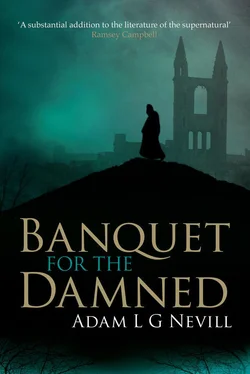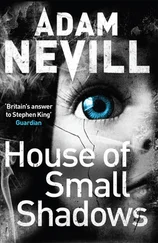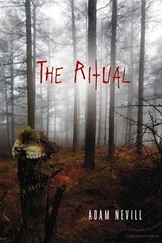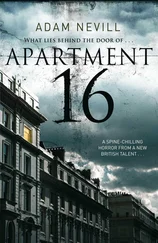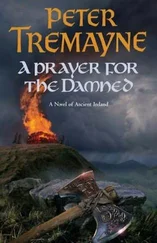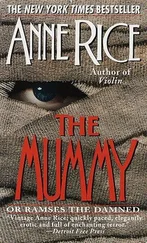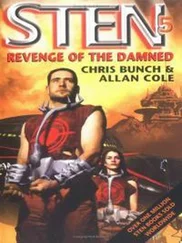There is a lot of thumping downstairs now, and someone is making a sound like a baby in distress. Marcia stops painting for a moment and closes her eyes to relish the honour of having it happen, right beneath her feet, in her own home. She places both smeared hands on the easel, and gently allows her head to fall right back between her narrow shoulders, where the bruises still hurt her. She sighs and shivers as the cold air of his arrival clothes her body.
Not long now before he leaves her, as swiftly as he came from out of the air and hills. Stronger than ever, stronger and pleased with her after the gift, the offering she provided. And when he is gone, she will go downstairs, turn the lights on, and see what has been left for her.
There is no wind, no traffic in the empty lane, and little sound beside the patter of rain through the trees and hedges by the road where he crouches, at the edge where the tarmac cambers into a drainage trench. Little can be seen in any detail around him, save the indistinct shapes of lime-green weeds, or pieces of pale rock. And for the moment he can go no further toward the cottage. The fire of anger and the cold suck of anxiety — or is it impatience? or desperation? — in his stomach, that forced him to drive out to the cottage within an hour of Harry and Arthur's departure, are gone, leaving him immobile now, twenty feet from the cottage gate.
In the Land Rover, he crawled at no more than twenty miles an hour through the unlit narrow lanes for the last stretch of the journey to Eliot's home, his courage gradually fading to futility, a sense of weakness before a greater foe. Traffic on the minor roads thinned once he was past the golf course on the outskirts of town, at nine. Cars behind and ahead passed away like the last few familiar faces in a threatening crowd, leaving him alone in the Fife countryside beneath a cloudy night sky, with only the headlights on full-beam to guide him, and they produced nothing but a comfortless glow of yellow before a backdrop of treeless hills. After a final small settlement of grey cottages, whose orange lights peeking from deep casements seemed to plead with him to turn back, Dante found the last turn on the map to take him to Eliot's home, where it all began.
While he laboured with the contagion of Beth, and when he defied her in the court, and then again, a final time, on the beach, were plans being made for a more suitable candidate? For Tom? For what? To join them? And it was all happening so quickly. There had been a haste in Eliot, a desperation for him to meet Beth. And in Beth too, for him to accept her companion. Instinct warns him their haste is for a reason: a point in time not far away, when something beyond everyone's comprehension will occur. And stifling him, making him all blocked and stopped inside, is the sense that Tom is gone. The moment Tom came out here with Eliot, was he lost? And he drove his best friend to this end. Dante dips his head and lets the worst of it pass.
He stands up and looks behind him at the road he has travelled and can now barely see. The Land Rover is parked half a mile back, tucked inside a shallow opening to a field, bordered on either side by a dry stone wall. Near the field was a sign indicating that Knoxville was two miles away, a landmark he chose so he could find the Land Rover again, in a hurry if need be. But if he is chased from the cottage, will he make it that far? Vivid recollections of his night on the West Sands start to leap through his mind. Quick nervous thoughts make him swallow and then take deep breaths.
For what seems like an hour, he is unable to move at all, and twice convinces himself to turn back and run to the War Wagon. Maybe he should wait for the following day and return, as planned, with Arthur and Harry. Then they can search for Tom by daylight, with the confidence of being in numbers, of not having to face uncertainty alone: like his trip to Scotland in the first place, when he took Tom — the sleek head beside him, the banter, the goading, the twitches of anger, the camaraderie, the bond that seemed unbreakable, the interest in one another inexhaustible. 'Jesus, Tom. What have I done?' he says.
But the following day will be too late. Missing for two days, Tom has been out here. Ill perhaps, a captive for sure. One more night is too long a time to wait for your best friend. Tom would do the same for him. He'd be right here too, looking for Dante, waiting for the moment to pounce at the cottage, knife in hand. Inside the inner pocket of Dante's jacket, the plastic handle of the kitchen knife — the only thing resembling a weapon he could find in the flat — pokes into his armpit. It is one of those long knives with a point and a serrated edge and a handle dimpled for grip when slicing vegetables, bread and cheese. It will mean he'll have to use it up close. Briefly, he imagines forcing a knife into a body. It makes him feel sick, and there is no strength in his arms after the thought has passed.
It's no good; he just isn't made that way. In his two fights at school he came away second best, and the one time he was attacked by a biker at a rock club in Nottingham, the whole episode became nothing to him but a blur, painless despite his many bruises, chaotic so no single image or word could stay in his memory. Just a tumble of emotion and a whirl of lights that left him nauseous and trembling when it was all over. He is no fighter.
But he must go in there with the knife and the screwdriver and torch from the War Wagon's tool box. Into the cottage to find Tom and bring him out. His throat closes and a cold sweat moistens under his arms. Fear is winning again, now he is no more than twenty feet from the gate.
Something else will have to do the terrible things for him. When the moment comes he must count on anger, fear and adrenaline to kick in, to remove his finer parts, and provide strength. 'Come on,' he whispers. It is a struggle to breathe steadily, and he's gritted his teeth without noticing, until the sound of them grating together makes him relax his jaw. Unsteadily, he rises to his full height and stretches his back. A long shiver runs over his body. His fingers are too cold to feel much. Before he freezes, or summons the virus back, he has to make a move. Now or never. For Tom and the poor bastard who lost his arm on the beach. They might get him, but he'll do some damage first. Yes, go. Go now. Pumping faster, his heart spreads a welcome heat through his body.
Running bent over, close to the grass verge between the drainage trench and the road surface, Dante makes it as far as the front gate then drops down from sight of the front windows. There it is: the pale stone of the wide front wall; the large square paddock-style garden, unkempt and clotted brown with leaves; the roof indistinct and lost amidst unpruned foliage: the dilapidated hovel Harry and Arthur entered in May and never since. The guttering is half gone, and the skeletons of two large floral arrangements are sunken beside the door.
He clambers over the wooden gate, not wanting to risk the clinking of metal or the squeak of hinge by using the latch, and drops to the path on the other side. He is in. Every nerve sings in soprano; his ears seem to hear the snapping of twigs on every side; there is a rush of blood and hormones to his head; panic rises like a wave and tries to swamp him into flight.
He runs to the left side of the front garden and follows the hedge all the way to the corner. Long grass, thick with rain, drenches his jeans to the knee. Branches from the hedge bordering the side of the front garden whip his face. Clouds cover one half of what's left of the moon and stars. But that is good. If someone were to walk out the front door, it would be hard for them to see him crouched down here. But if they do not need to use their eyes to find a trespasser, what then?
Читать дальше
